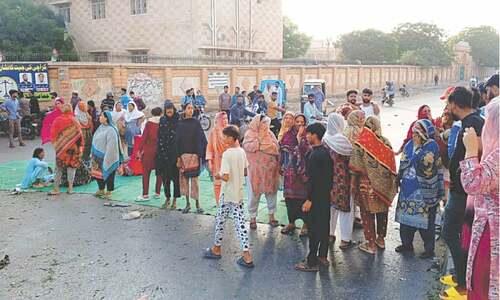KARACHI: The Sindh government has set up intelligence committees at district and division levels to “measure threat perception”, share information with higher authorities and assist the provincial government in implementation of the National Action Plan, officials and sources said.
The committees would consist of officers of the civil administration, law enforcement and intelligence agencies.
The 29-point terms of reference (TORs) for the committees, they said, mentioned all major functions of intelligence gathering in divisions and districts of the province including pre-emptive action against activities of proscribed outfits, monitoring of non-mandated activities of the non-governmental organisations and continuous monitoring of implementation of sanctions against listed entities and individuals.
The committees will also keep an eye on proscribed outfits and ‘non-mandated’ acts of NGOs
“The divisional intelligence committee would be headed by the respective commissioner while the committee at the district level would be looked after the deputy commissioner,” said a source citing details of a home department notification. “Other members of the committee included the district police head, divisional head of the Counter-Terrorism Department (CTD), district head of Special Branch and senior officers of intelligence agencies.”
The source said that the key objective of the exercise was to enhance intelligence-gathering system to assess the level of threat and suggest measures for the effective implementation of NAP.
Sources also shared a few key tasks of the committees included taking cognizance of local level threat information and sharing the same with the provincial government.
They said that the committees had been tasked with building database of all public facilities and those buildings where free movement of people was allowed.
“The committees would carry out an exercise to collect all relevant facts to set up a comprehensive database which included details of madressahs, mosques, hotels, shrines, motels and major residential buildings in their districts and divisions,” said another source while referring to detailed task of the committees.
“Interestingly, the committees have also been mandated to identify those businesses or individuals who have history of financing or harbouring terrorist elements or local masterminds. Similarly, the committees have been asked to visit the educational institutions and check the security measures put in place,” the source added.
Citing security audit reports of different facilities including educational institutions and commercial establishments, the provincial government had directed that the loopholes be re-examined, plugged and that all possible necessary security arrangements be adopted, the source said, adding that the exercise would help assessing a true picture of the state of security arrangements in different districts of the province.
Security of foreigners, mainly Chinese nationals, was also taken into account by the Sindh government while assigning the job to the intelligence committees, the source added.
“To ensure foolproof security of foreigners especially Chinese working/visiting/residing in the respective divisions/districts through divisional and district monitoring committees. Implementation of SOPs [standard operating procedures] issued by the home department for the security of foreigners/Chinese,” said one of the 29 ToRs.
After the recent action in Karachi by the police that busted organised gangs that had been selling subscribers identity module (SIMs) of different cellular companies through illegal channels, the Sindh government had decided to put check on the business in other parts of the province through the intelligence committees.
“According to the ToR, the committees would also ensure action against illegal sale of cell phones and their connections. Similarly, the committees have been asked to monitor and report the non-mandated activities of local and international NGOs in the province,” said the source.
Published in Dawn, May 27th, 2019















































